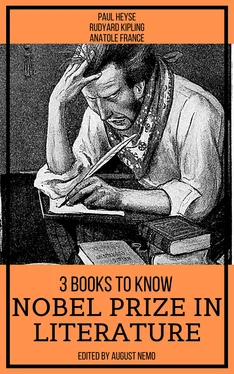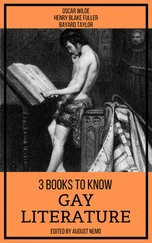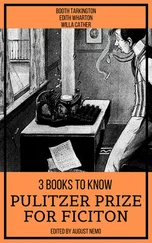The third house from the corner on the right hand side—now he was standing before it. The early hour, which was by no means suitable for visiting, did not trouble him in the least. Yet he willingly allowed Mohr, who happened to meet him just in front of the house, to drag him away for some distance, and listened patiently to his contemptuous criticism of a new tragedy which had created a great furore the evening before, and which was a wretched abortion, badly pieced out with stolen fragments. What was at this moment, the "degeneration of the German stage" to him! what even his friend's hopes that his "sinfonia ironica" would at last obtain recognition, since a very able musician—he did not say it was no other than Christiane—was sincerely interested in it. They saw Franzelius on the other side of the street, engaged in an eager conversation with a dirty fellow in a blue blouse. He recognized them, but pulled his cap farther over his face and looked away. Mohr was just beginning to criticize the first number of the "Tribune of the People," which he had with him and which he declared to be an infallible remedy for melancholy. But Edwin suddenly turned away, and under the pretence that he had a lesson to give in that house, hastily retraced his steps as if to make up for lost time, and went up the steps without delay.
His heart beat even more violently than at his first visit to her. On reaching the landing, he tried several times in an undertone, to see if he had breath enough to say good morning. But not until he had gazed at the bell handle for at least ten minutes, did he feel sufficiently composed to ring and ask the old woman who opened the door, if Fräulein Toinette Marchand was in.
"She lives here," was the reply, "but it is so early that she isn't dressed yet."
"She will probably see an old friend," replied Edwin quickly, and without heeding the woman's gesture of denial he crossed the threshold. At the same moment, one of the doors leading into the corridor opened, and the beautiful face, looking twice as charming in a lace morning cap as it had ever seemed before, suddenly appeared.
She recognized him instantly; an involuntary movement of the head told him that her first thought was to refuse to see him, but the next instant she changed her mind.
"Is it you!" she exclaimed, but without betraying any surprise in the tone. "I half expected you; I know no one can escape destiny. Come in. You will doubtless excuse my cap."
He silently followed her into a neatly furnished room. His emotion was so great, that he vainly strove to utter a few indifferent words, and as if exhausted by a long walk, he sank down into one of the chairs beside her sofa. Neither did she seem to know what tone to adopt. Standing beside a flower stand, which however contained no exotics like the one in Jägerstrasse, she busied herself in pulling off the yellow leaves, and in binding up a drooping tendril.
He had time to look at her. She was attired, in a simple morning dress, which displayed her supple figure to even more advantage than her usual costume, and the little cap on her wavy brown hair gave her a somewhat matronly air, which contrasted most charmingly with the pale, childish face.
"My change is very much for the worse, don't you think so?" she asked, still busied with the flowers. "This plush furniture—it's said to be an elegant apartment, but in comparison to the really stylish appearance of the old rooms, looks like a mere lumber shop. However, I can pay this quarter's rent and live among respectable people. But tell me, how did you discover me? I thought, as I had discharged the carriage, and no longer allowed the dwarf, who begged most pitifully to be kept, to wear livery, I could live here in the most complete incognita—so long as my money lasted. You were angry with me because I vanished so suddenly, were you not? Look into my face and tell me frankly, whether you were really angry or not?"
She had turned hastily toward him and was now gazing at him with beseeching, mischievous eyes, as if she no more doubted the falsity of her words, than that he would be weak enough to show mercy before justice.
"My dear Fräulein," said he, trying to smile, "as you have, unfortunately, never permitted me to show you any kindness, I've not ventured to take the liberty of being angry with you. I had forced myself upon you, you took the first opportunity to get rid of me—that's so natural, that a man needn't be your 'wise friend' to understand it."
"Oh! no," she answered thoughtfully, "that's not exactly it. Do you know that I've more than once commenced a note to you, to tell you where I was to be found. Then I tore it up again. Silence seemed to me wiser for us both; wiser for me, that I might wean myself in time from that most dangerous luxury: a friend; and wiser for you, because some day you might get tired of being my 'wise friend,' and then the affair would end in a way I would fain spare you. You smile. So much the better, if you find no danger in it. Besides, it would now be too late; you've found me again, probably your friend the doctor, who saw me at the window yesterday, tattled. I'm very glad you're here. You can't imagine what tiresome hours I've spent, almost always sad or listless."
"Where did you wish to go?"
"Yes, where? That was just the question. Back to my commonplace poverty—ah! at the thought a cold shudder ran over me, as if I were about to jump into a marsh and sink up to my neck. To stoop to the yoke of a governess, here in the city, where I've lived as a great lady, seemed terrible too. So I shall live on in this way a few weeks longer, and then when the last louis d'or is exhausted, close my eyes, and dare a plunge—into the great nothing. Or do you believe that there is a something?"
"No," he answered quietly. "And for that very reason, it seems to me folly to hastily throw away the something we possess here."
"Hastily? How long is one to wait? When would you permit a person, who did not find this something worth the trouble it costs, to take refuge in nothing?"
"When he quite despairs of being anything in the world, of making himself useful or giving pleasure to himself or anybody else."
"Well then—in that case, you might without hesitation sign my passport for departure. For that I am an utterly useless creature, and at the utmost can only afford Jean Jacques a little pleasure when I give him five groschen to feast at a cake shop—"
The tears that she had vainly endeavored to repress, burst forth, yet she did not turn away from him, but stood at the little table before the sofa, resting both slender hands on its polished surface as if to support herself, while large drops fell from her black lashes.
Edwin watched her with the deepest sympathy. He was obliged to use the greatest self control, to refrain from standing up and clasping her in his arms, to console her as one would a child.
"If you did not endure my presence simply for the sake of my wisdom," he said as calmly as possible, "I would give you the most absurd proofs, that your existence was a necessity of life to some one besides Friend Jean, a blessing, a source of joy, though to be sure not wholly unclouded. But aside from all nonsense: you must not go on so, Toinette. You're quite right: one who lives so during the day, at last passes out of the day into the night that has no morning. I see that I've come just at the right time. Courage, child, courage! Permit me to tell you that you don't yet understand the life you wish to cast away. No indeed," he continued, as she gazed at him through her tears with a look of surprise, which seemed to say: 'yet I've experienced enough'—"you know only want and affluence; but there are a thousand steps between, on which a sensible person can sit down very comfortably and accommodate himself to the world. To be sure, he must possess one thing to make life endurable anywhere."
Читать дальше












